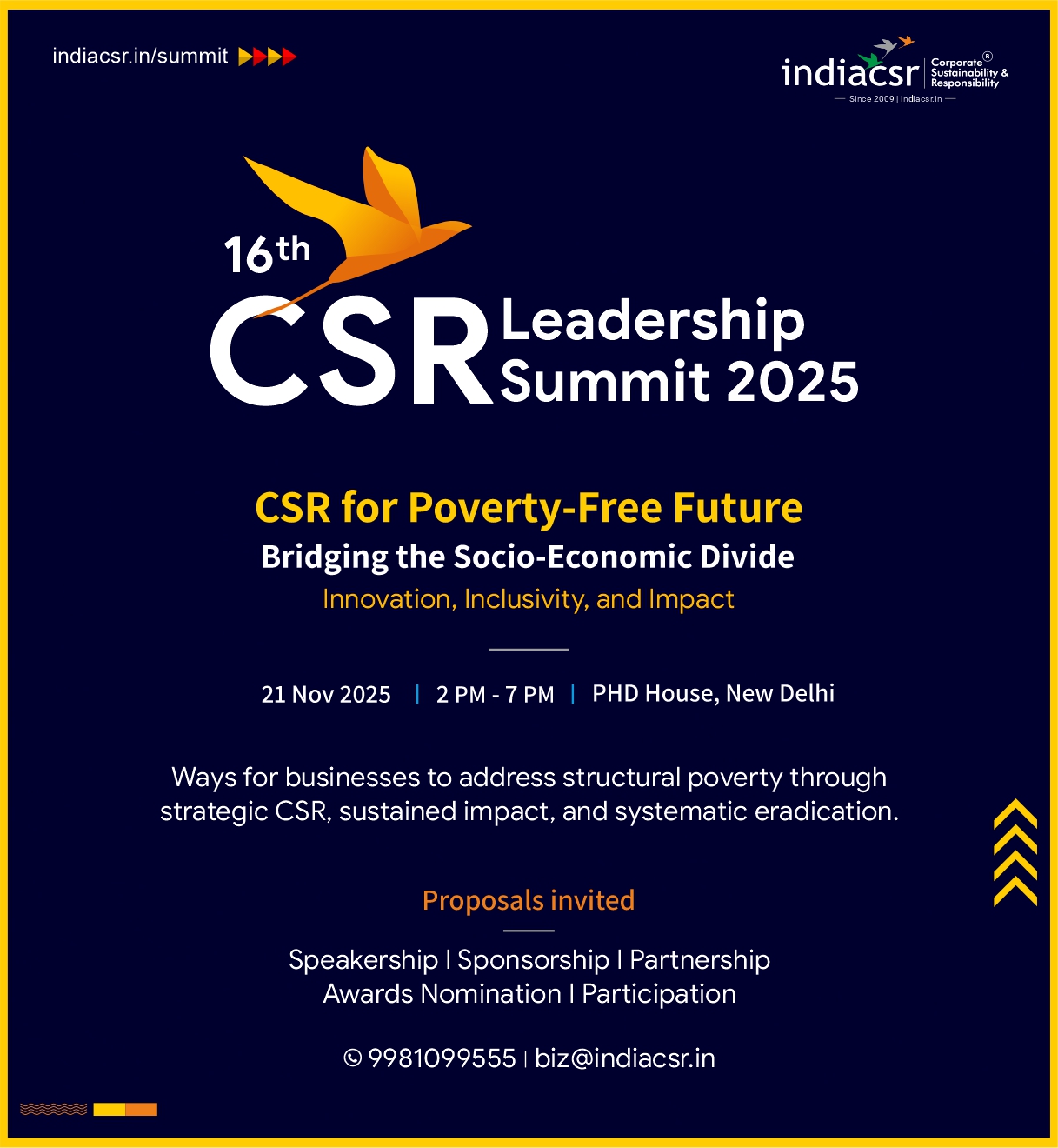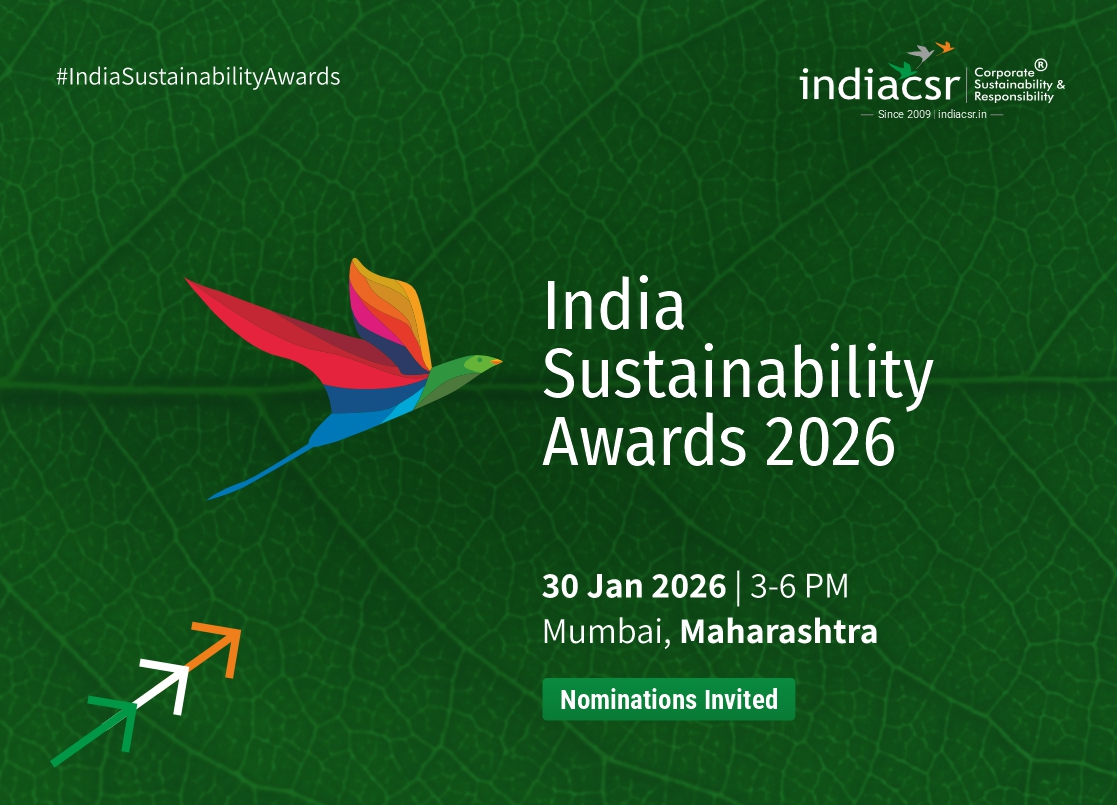Our today’s interaction is with Sridhar Iyer, National Director, CSR – EY. Rusen Kumar of India CSR Network talks him on CSR journey and the impact created. He is elaborating EY Foundation’s overall CSR philosophy. EY Foundation (EYF) is a not-for-profit organization engaged in community-oriented initiatives. Edited excerpts:
What was the drive/motivation behind creating the EY Foundation?
Through the work we do with our clients, EY contributes to building a better working world every day. In early 2000s, as the organization acquired greater scale in India, we decided to give more focus and formal structure to some of the community work, which we had started to do around the same time. As an organization, we felt that we needed to do much more to make a meaningful contribution to the communities we serve, especially considering the growing inequalities where many have been bereft of the benefits of significant economic growth of the country.
With that intent, the EY Foundation was founded in 2004 as a not-for-profit arm of EY in India to drive developmental initiatives for the wider communities we operate in. We chose the areas of Education, Entrepreneurship (especially rural women entrepreneurship) and Environment – where we believe our knowledge and experience can help create a large and sustainable impact. In each of these areas, we apply our problem solving approach and work closely with our NGO partners and community members to ensure a positive and lasting change.
How do you identify the socio-economic issues to address, and how do you plan to rectify them?
We realised early on that education and skill development are the most fundamental enablers for achieving India’s demographic advantage. As a professional services organisation, it was imperative that we made far-reaching interventions to widen the education net for students across the country and therefore started our CSR journey by working with a non-formal education centre for 150 children at Dakshinpuri in New Delhi.
We want to be in areas where we can apply our knowledge and experience and also involve our people in the journey. In 2007, we started the EY Scholarship program to enable academically bright young people from economically weaker sections access higher education and gain employability skills. Today, we support 3,000 students each year with 60% girl students and beyond financial support, these students are provided soft skills and English communication skills training, career guidance and are mentored by EY people. Over 8,000 young students have benefitted from EYF scholarships in the last 11 years. Today, we also have several programs in primary education in partnership with NGO organisations that focus on increasing access and improving classroom learning for lakhs of children across the country.
We apply a similar approach in our rural women entrepreneurship programs too. EY has a legacy of fostering entrepreneurship and partnering with entrepreneurs in their growth journeys. Working at the heart of rural India, we have learned that economically empowering women can play a crucial role in accelerating access to education and healthcare for rural families and creating a brighter future for the next generation. We support Women Self-Help Groups (SHGs) in more than 3,000 villages, enabling over 175,000 women learn new skills and increase their family income.
Collaboration is the other fundamental pillar of our CSR outreach. Across all our programs, with the exception of EY Scholarships, which we administer ourselves and Toon Masti, an educational cartoon series developed by EY, we collaborate with our several NGO partners such as Sampark Foundation, Indus Action, Development Initiative, APMAS, Harsha Trust, among others, to ensure we are creating lasting models of change.
What is that single motto you follow for EYF, which has led to its success? Can you please elaborate on your vision?
Besides taking a problem-solving approach, scalability and replicability of our programs is an important lens we apply and are our guiding principles. How can we replicate the program in more villages and states? How soon can we make the community self-sustainable and self-reliant? We believe that the beneficiary has to move from being a recipient, to becoming a partner in the journey and finally owning the entire process. We like to ensure that every project we fund demonstrates the capability to becoming self-sustaining over a period of time. At the same time, given the size of our country and the scale of the problems we are trying to address, it is critical that the project is economical to ensure continuity and sustainability.
Towards that end, we undertake projects which are exclusively funded by EY as well as work closely with several grassroots-level organizations to not only help these organisations scale-up and expand their reach, but also help improve their existing models of operations to make them more effective.
How is EYF’s philosophy different?
At EY, we strongly believe corporate responsibility is a critical aspect of business conduct and therefore for us, it has been a completely voluntary effort for the last 12 years. Our philosophy is of problem solving and not limited to “doing good” and we believe in collaborating with grass-root organisations and local communities to change their lives. Our people are the other strong pillar of our CSR outreach, who participate enthusiastically in several community giving, disaster relief and environment programs.
Having said that, if I look at the corporates across the board, the law has brought about a structure and governance to corporate philanthropy. Several responsible companies have been doing very meaningful work yet there are many, who are still finding their sweet spot; and while the philosophy and approach may vary, I think we need to make bigger and faster strides in this long journey. The scale of the challenge is humungous and the need of the hour is to find common areas of collaboration and using our collective might to enable long-lasting change.
Please share some success stories across environment, entrepreneurship and education.
Education
Many of the education related programs we fund are in the areas of primary education, where our objective is not only to bring more children into the school but also improve their classroom experience. Our collaboration with Indus Action, for example, is focused on enabling them to provide quality education to millions of children from economically weaker sections (EWS) background under the Right to Education Act. It is a simple, low-cost and more importantly, replicable model, since the law is applicable to every state in India and has the potential to bring two million children into the education ambit. Our work with Ramakrishna Mission in Kolkata is designed differently, where we use the power of technology to reach thousands of children in rural parts of West Bengal.
Our work with Sampark Foundation in Chhattisgarh and with Development Initiative in Kanker, are aimed at improving classroom learning for children in class I to V and taking remedial measures. We have also developed Toon Masti, educational cartoon series, based on NCERT syllabus that makes learning fun for primary school children. This has been deployed in several government schools and institutions in Tamil Nadu, Haryana, Chattisgarh, Madhya Pradesh, Delhi, Ajmer district in Rajasthan and Puducherry with the potential to impact five million children.
Entrepreneurship
Our work in rural entrepreneurship has truly demonstrated that financial inclusion of women can indeed unlock economic opportunities and affect social change in a sustainable manner. Through the women Self-Help Groups (SHGs) that we support along with our NGO partners, we have seen some real change in the way women learn new occupational skills, feel empowered to take their family decisions and even train others. Today, over 175,000 women in more than 3,000 villages across 10 states are benefitting through increased access to credit and are significant contributors to their families’ incomes while improving education and healthcare prospects for their children.
In many of the villages, in line with the needs of the people, we have supplemented our interventions with farmer education on increasing farm productivity, adopting water-saving irrigation techniques and animal husbandry practices.
Environment
EY has taken a voluntary pledge to be carbon and water neutral by 2020. We believe simple and convenient measures can result in massive savings when it comes to conserving our natural resources. For example, just by installing bio blocks in men’s washrooms and aerators in taps across our locations, we save over 16 million litres of water each year. Additionally, we involve our people in this journey through various opportunities. Each year, our employees travel to Uttarakhand and plant trees along with the local community. On every employee’s birthday, the organisation has taken the pledge to plant five trees; so far we have planted over 900,000 trees.
You talked about your people involvement in CSR programs. Can you elaborate more on the initiatives EY employees are enthusiastic about?
We have several programs to encourage our people to lend their support to programs that enrich the quality of life and opportunities for all citizens. These programs include, ‘Give Back to Society’ (GBS) program where we encourage people to generate funds, resources and campaign for an NGO or a cause of their choice, and the organisation incentivises the employee to the extent of 60% of the employee’s contribution subject to overall limit per NGO per employee. Under ‘Sponsor a child education’ initiative, employees contribute 50% of the costs a student’s education and the balance 50% is funded by the Foundation. Our people have generously contributed to some recent disaster relief measures including for the recent Kerala floods, Chennai floods in 2016, etc. Besides, we have blood donation drives and clothes and books donation drives through the year, where we again receive enthusiastic participation. For last five years, we have been collecting 30,000kg clothes each year, which is then donated to underprivileged people through our NGO Partner. On the environment front too, besides the annual tree planting drive in Uttarakhand, our people in Chennai and Mumbai conduct regular beach cleaning drives, taking forward the Government’s vision of “Swachh Bharat”.
What are your future initiatives which are expected to have a large scale impact?
In line with our focus on environment protection, we recently funded a program to address the issue of deteriorating air quality in northern India caused due to the practice of crop burning in Punjab and Haryana. The initiative, led by India ParyavaranSahayak Foundation (IPS Foundation), is aimed at educating farmers on cost effective and convenient alternatives to crop burning, such as Super Straw Management System (SMS) (which, in fact, have been mandated by the Punjab government) and Happy Seeders, that can help farmers sow the next crop without clearing the standing stubble.
This method of crop stubble management not only allows timely sowing of new crop between harvest and onset of monsoon, but can also potentially reduce CO2 emissions by about 3 lakh tons over the next two years and save up to 48 million litres of water. In the phase I of the initiative (July 2018-Dec 2019), IPS Foundation will reach farmers in over 300 villages across 5 districts and cover approximately 33,000 hectares and manage about 1.8 lakh tons of stubble.
Our funds will enable IPS Foundation to organise training and education sessions, connect with equipment suppliers and we will work with them closely on propelling the project further and fine-tuning their model along the way. It is a one of its kind initiative by a not-for-profit driven by some very enthusiastic individuals, and we are very optimistic that the project will have a deep impact not only in the intervention villages but will also result in widespread adoption across Punjab once the results are visible. We do look forward to breathing cleaner air in the years to come!
Disclaimer: The views expressed by the interviewee in this feature are entirely his own and does not necessarily reflect the views of India CSR Network and its Editor.
Terms & Conditions: India CSR Network does not permit other Websites/Agency to copy or reproduce or reprint the above article/feature in any form or means.
Read More Exclusive Interview on CSR







